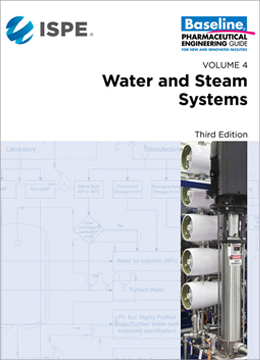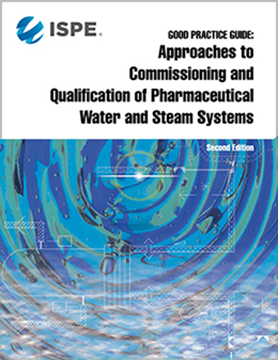Pharmaceutical Water Generation (T04) - Updated!
Overview
Note: ISPE has two Pharmaceutical Water training courses that we deliver consecutively at our training events. You might also be interested in the Storage Delivery and Qualification of Pharmaceutical Waters training course.
Pharmaceutical water is perhaps the most important of all pharmaceutical utilities. It is used as an excipient in many pharmaceutical formulations, as a cleaning agent, and as a separately packaged product diluent. In addition to non-compendial systems, pharmaceutical facilities typically include systems for generating USP Purified Water (PW) and USP Water-For-Injection (WFI). This online course has been substantially updated to feature the guiding principles of the ISPE Baseline Guide: Water and Steam Systems (Third Edition) with particular emphasis placed upon the new chapters for microbial control and key design philosophies. The course will also include regulatory background information and design concepts from the new Good Practice Guide: Membrane-Based Water for Injection Systems. The material provides insight into global requirements and recommendations for alternative WFI production methods to distillation. The course will also include material from the ISPE Good Practice Guide: Sampling for Pharmaceutical Water, Steam and Process Gases.
What You Will Learn
This training course will cover the principles of design and operation of water systems used directly in pharmaceutical manufacturing and laboratory applications, including the essential concepts and principles of systems used to generate USP and non-compendial waters. These concepts include specification, design, operation, testing, and maintenance of equipment and systems for water generation. Participants will examine methods for proper water quality selection, information on compendial and non-compendial waters, fundamentals of basic water chemistry, and information on common unit operations (deionization, reverse osmosis, and distillation). Pre-treatment systems, detailed guidance for selection of construction materials, and operations issues related to pharmaceutical water generation systems will also be discussed.
It is important to note that the different compendial pharmaceutical waters have different specifications. The commissioning and qualification practices described in the Baseline Guide Vol 4: Water & Steam Systems 3rd Edition to create and preserve water quality, in both generation systems and distribution systems, may vary according to the type of compendial water. Common water system myths will also be explored and a variety of practical system designs will be evaluated for USP and FDA compliance, as well as their advantages and disadvantages. Particular attention will be paid to system and component sanitization procedures and microbial control.
Resources and Activities
- Pre-Course Work Materials
- Interactive Exercises
- Learning Assessments
- ISPE Baseline Guide® Water and Steam Systems (Third Edition)
- Good Practice Guide: C&Q of Pharma Water & Steam Systems 2nd Edition
Course Modules
- Introduction & Regulatory Background
- Planning & Programming Water Systems
- Basic Water Chemistry Concepts
- Water Systems Microbial Considerations
- Feed Water Characterization
- Basic System Review
- Pretreatment Systems
- Reverse Osmosis Theory and Design
- Deionization Processes
- Processes: UV, MVD, UF & MF
- Distillation
- Purified Water Systems
- Water for Injection Systems
- Non-compendial System Design & Foreign Compendial Systems
- Water for Laboratory Use
- Pharmaceutical Steam
- Appendices
- Exercises
Who Should Attend
- Pharmaceutical professionals who are new to water treatment systems or those with significant engineering expertise from another industry who need to learn about pharmaceutical water treatment systems
- Those with significant industry experience in other capacities who now have water generation system engineering and/or maintenance responsibilities and want to gain a fundamental understanding of the requirements for designing, building, operating testing, and maintaining these systems
- Water treatment systems quality assurance and quality control specialists, manufacturing supervisors, technical support personnel, and all levels of management who want to gain a fundamental understanding of pharmaceutical water generation systems
- Those with significant pharmaceutical water experience who want understand current industry trends and ISPE consensus views.
Additional Course Details
This training course includes a pre-recorded Webinar that provides a review of the basics prior to the classroom course. Access information will be provided via email one week prior to the start of the training event.Learning Objectives
Learning Objectives:
- Discuss regulatory requirements, current FDA views and current Good Manufacturing Practices (cGMP) as they relate to pharmaceutical water systems
- Explain the effect of the cGMPs, FDA guidance documents, ISPE Baseline® Guides, and other reference documents on water system design, construction, maintenance and validation
- Compare common water process design alternatives for USP PW and WFI system
- Differentiate regulatory requirements from regulatory myths relative to water treatment systems
- Apply the fundamentals of basic water chemistry
- Identify detailed unit process performance characteristics and design parameters
- Understand fundamental water quality requirements and the difference between compendial, non-compendial and laboratory water systems
- Define the fundamentals of various generation system alternatives
- Ability to defend and critique design, operation and maintenance practices with the ability to identify issues and troubleshoot component
Community of Practice (COP)
This training course is of particular interest to existing and future members of the ISPE Critical Utilities Community of Practice (COP).

